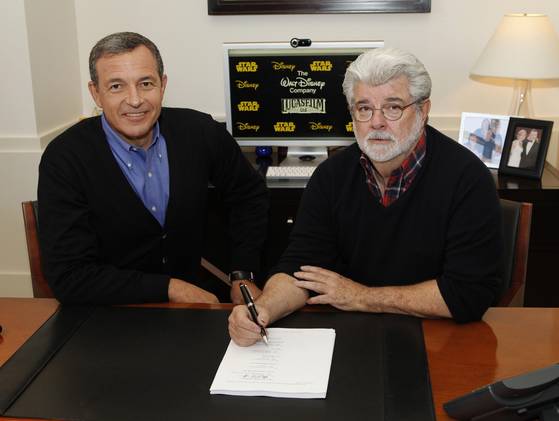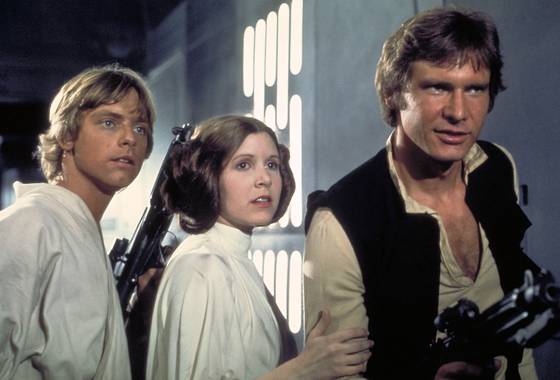Disney buys Lucasfilm for $4B. Star Wars "Episode 7" for 2015.

Disney, CEO Robert Iger, left, and George Lucas of Lucasfilm sign the deal Tuesday letting Disney acquire the "Star Wars" studio for about $4 billion.
Disney is buying Lucasfilm Ltd., the production company behind "Star Wars," from its chairman and founder, George Lucas (shown here). It's also making a seventh movie in the "Star Wars" series, called "Episode 7," set for release in 2015.
Lucas, who receives 40 million Disney shares from the deal, will be the second-largest non-institutional shareholder of Disney, Bloomberg News says, behind the trust of deceased Apple co-founder Steve Jobs.
The 68-year-old Lucas will serve as a creative consultant but plans to retire.
"For the past 35 years, one of my greatest pleasures has been to see Star Wars passed from one generation to the next," said Lucas, chairman and CEO of Lucasfilm, in a statement. "It's now time for me to pass Star Wars on to a new generation of filmmakers."
Said Disney CEO Robert Iger: "This is one of the great entertainment properties of all time, one of the best branded and one of the most valuable, and it's just fantastic for us to have the opportunity to both buy it, run it and grow it."
The big screen isn't the only place that there might be tales from the galaxy far, far away. "We really like Star Wars' potential on TV as well," Iger says, "and we think (cable-satellite channel) Disney XD will be a great home for that."
The buyout is Disney's fourth largest deal ever. It's behind the $19.7 billion, $7.6 billion and $5.2 billion buyouts of Capital Cities/ABC in 1995, Pixar in 2006 and Fox Family in 2001, respectively, says S&P Capital IQ. It tops the $3.96 billion Disney paid for Marvel in August 2009.
Disney expects to more aggressively expand the Star Wars film schedule, Iger said in a statement. Following the release of Episode VII in 2015, "our long term plan is to release a new Star Wars feature film every two to three years," Iger said.
Star Wars Episodes VIII and IX, Iger said, would follow "probably on a cadence of every other year and then go from there. . . . The (first) film is in early stage development right now."
Based on Disney's closing price on Oct. 26, the deal is valued at roughly $4.1 billion. Disney (DIS) will pay half that value in cash and issue 40 million shares of Disney to pay for the rest. Also included in the deal are special-effects house Industrial Light & Magic, Skywalker Sound and video game company LucasArts.
Lucasfilm spokeswoman Lynne Hale said Disney's "intent is for everyone (in Lucas' various companies) to stay where they are." ILM is headquartered in the Presidio in San Francisco, while Skywalker Sound and Lucasfilm are on a series of ranches Lucas owns in Marin County.
"As far as the legacy George has created, we don't take that lightly," Disney chief Iger said. "We definitely plan to expand the presence of Star Wars in our parks which could include new parks."
Wall Street is hopeful Disney can quickly recoup the money by fully tapping the potential for more movies, theme park tie-ins and merchandise, says David Miller, analyst at investment research firm Caris. "If you look at how acquisitive Disney has been, it's all about content," he says. Lucasfilm "is one of the great entertainment franchises of all time."
Many investors were caught off guard by the announcement, but there have been questions about what Disney would do with its mounting pile of cash. Disney had $4.4 billion in cash and short-term investments as of the end of June. "Disney did a good job keeping this quiet," Miller says.
Kathleen Kennedy, co-chairman of Lucasfilm, will report to Walt Disney Studios Chairman Alan Horn. Kennedy, who produced Schindler's List and War Horse, will become the new studio president and be executive producer on the new films.
Film critic Leonard Maltin, also a historian of the medium, was taken aback by the news and had questions about it.
"There's no way of telling where this is going to go at this point," Maltin said. "Obviously Disney, as they did with Marvel, is investing in a bluechip property that will yield dividends for years to come.
"But it's not a fresh property," he added. "But it remains to be seen if they revive the characters. There are a lot of unanswered questions."
The latest part of the Star Wars saga, Star Wars Episode VII, is targeted for a 2015 release.
Peter Sealey, a California professor and former president of marketing and distribution for Columbia Pictures, says it appears Lucas gains the most out of the deal.
"George Lucas was never a part of Hollywood, he was always an outlier who left for northern California as soon as he had a hit," Sealey said.
"So this is an end of an area, the story of a brilliant filmmaker who had one incredibly long home run. This was the only exit strategy he really had. He never wanted to grow the company."
Sealey said he can't imagine Disney would let Lucasfilm's entities keep operating away from Disney's home base in the Los Angeles area. "I don't see how or why you keep any of this up in that area, it'll all move down to Burbank," he said.
Disney's theatrical lineup could use a boost in some areas. While the studio's animatedWreck-It Ralph, due Friday, has healthy buzz, other recent releases such as Mars Needs Moms and John Carter have disappointed.
"We actually determined that we'd be better off as a company releasing a sequel to Star Wars than probably most other, I'll call them 'not yet determined' films," Iger said. "So we love the fact that this will take its place in our live-action strategy as an already-branded, already-known quantity."
Disney, The Force be with you.

USAToday.







0 comments:
Post a Comment